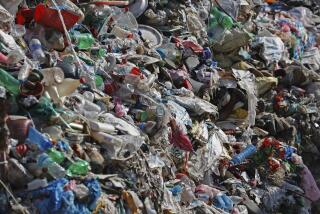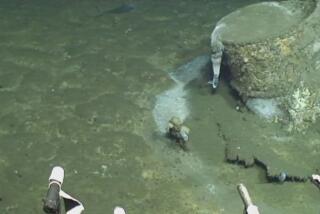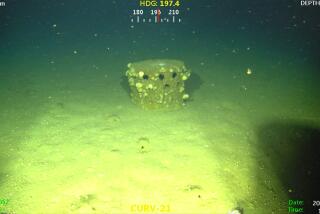U.S. Antarctic Base at McMurdo Sound a Dump : Environment: Trashing began in last century with the start of exploration. The waste area is fenced off to slow the escape of wind-blown rubbish.
MCMURDO SOUND, Antarctica — “Macktown,” as the locals call the U.S. base at McMurdo Station in the Antarctic, has the air of a junkyard.
Set against the magnificent volcano of Mt. Erebus and looking out across McMurdo Sound to the pristine pinnacles of the Royal Society Range, it starkly highlights the human impact on the environment.
Bulldozers churn the snow a dirty gray, zigzagging wires and suspended pipes scar the skyline, the ground is littered with tires and oil drums.
“It’s like a Yukon mining town gone wrong,” says tour guide Colin Monteith.
“The trashing of the Antarctic” started when exploration began last century, said Peter Wilkniss, director of polar programs for the National Science Foundation, or NSF, which manages McMurdo, the continent’s largest base.
“If you look at (Capt. Robert) Scott’s hut, these people left everything they brought--they left dead dogs, gas bottles, the food. At that time they cared about only one thing--the glory of exploration.
“Today people require more cuddling so you have to bring in the modern world. It was not only us, it was New Zealand, the Argentinians, Australia--every country.”
In 1989, the National Science Foundation began a 5-year, $30-million program to clean up McMurdo with its population of 1,100.
At the back of the town--a mishmash of buildings ranging from World War II-type canvas-covered sleeping quarters to modern laboratories like warehouses--lurks its main dump.
Surrounded by a mesh fence to slow the escape of wind-blown rubbish, it looks like any other town tip and is the foraging ground of Antarctic skua sea birds.
The NSF had to close the McMurdo dump this year because potentially cancer-causing asbestos used as insulation material was found there.
The dump contains hundreds of unidentified barrels, mostly full of fuels and human waste, all of which have to be identified before being shipped out.
A company has been contracted to clean up the rubbish, but it has not been decided what to do with the contaminated soil.
One suggested solution for the rubbish dump is to bury it with earth and seal it.
“People are saying, ‘Don’t bring anything back into our country’ and at the same time, ‘Don’t leave anything in the Antarctic,’ ” Wilkniss said.
He said he would not object if a Third World country accepted the waste for processing.
“If they take it and make a business out of it, it’s a business proposition.”
The environmental group Greenpeace, which has a camp nearby at Cape Evans, says McMurdo should never have got into such a mess and its cleanup is not enough.
“The attitudes in McMurdo are something you might have seen in the 1950s and the environmental practices going on would have the managers of the NSF in jail or paying heavy fines for the pollution they have done if they were in the U.S.,” said Greenpeace’s Keith Swenson.
“They live in the beauty of the Antarctic, and it is literally a dump.”
Swenson says the U.S. cleanup budget overstates real spending on cleaning.
“What they are spending on the cleanup includes a lot of administrative and transportation costs. The actual money that goes into the cleanup itself is probably far, far less.”
Some parts of McMurdo, such as the small port area, Winter Quarters Bay, are probably beyond repair. It has high levels of toxic chemicals and Wilkniss says disturbing the bay, where the original dump was, may do more harm than good.
The United States will be abiding by the newly adopted Madrid Antarctic Protocol, which has laid down stringent new environmental provisions, even before it is ratified.
However, the protocol’s tough environmental articles will be at the cost of science programs, which are the principal reason for most activity in the Antarctic, Wilkniss said.
“We have to say: ‘Is it worth it to have some environmental impact in the Antarctic because of the science, the research and the results that we can get? Is it possible to sustain a forefront research program and support its needs in the Antarctic?’
“My answer to both these questions is a resounding yes. The results that come out of this continent and the research affect the whole world.”
Greenpeace has decided to withdraw its permanent base from the Antarctic this year, partly due to the cost and partly because of its success. Environmentalists consider the Madrid Protocol a major victory. Also, most of the bases have initiated cleanup campaigns.
More to Read
Sign up for Essential California
The most important California stories and recommendations in your inbox every morning.
You may occasionally receive promotional content from the Los Angeles Times.










